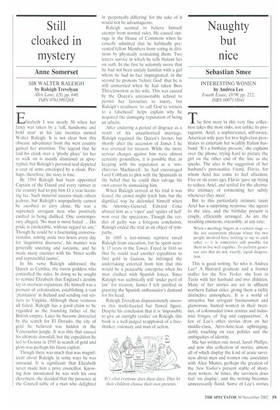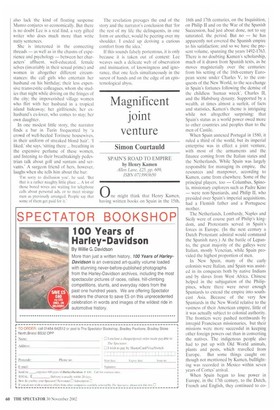Naughty but nice
Sebastian Smee
INTERESTING WOMEN by Andrea Lee Fourth Estate, T9.99, pp. 222, ISBN 0007135041 The first story in this very fine collection takes the most risks, not unlike its protagonist. Arid, a sophisticated, self-aware. American wife pays for two high-class prostitutes to entertain her wealthy Italian husband: 'It's a birthday present,' she explains over the phone, trying hard to picture the girl on the other end of the line as she speaks. The idea is the suggestion of her husband's provocative friend, Flavio, for whom Arid l has come to feel affection. Five or six years ago, Flavio 'gave up trying to seduce Arid, and settled for the alternative intimacy of tormenting her subtly whenever they meet'.
But to this particularly intimate taunt Arid l has a surprising response: she agrees to the idea, and the birthday present is crisply, efficiently arranged. As are the resulting emotions, ostensibly, at any rate:
When a marriage lingers at a certain stage — the not uncommon plateau where the two people involved have nothing to say to each other — it is sometimes still possible for them to live well together. To perform generous acts that do not, exactly, signal desperation.
This is good writing. So who is Andrea Lee? A Harvard graduate and a former staffer for the New Yorker, she lives in Turin with her husband and two children. Many of her stories are set in affluent northern Italian cities, giving them a richly distinctive atmosphere. It is a world of attractive but arrogant businessmen and glamorous, hunted women in their twenties, of colonnaded town centres and industrial fringes, of 'fog and cappuccinos'. A few of Lee's other stories draw on her middle-class, Afro-American upbringing, deftly touching on race politics and the ambiguities of identity.
She has written one novel, Sarah Phillips, and now this collection of stories, almost all of which display the kind of acute sa\rviness about men and women one associates with Alice Munro, perhaps the greatest of the New Yorker's present stable of shortstory writers. At times, the savviness does feel 'on display', and the writing becomes unnecessarily florid. Some of Lee's stories also lack the kind of floating suspense Munro conjures so economically. But there is no doubt Lee is a real find, a very gifted writer who does much more than write natty sentences.
She is interested in the connecting threads — as well as in the chasms of experience and psychology — between her characters' affluent, well-educated, female selves (invariably in their sexual prime) and women in altogether different circumstances: the call girls who entertain her husband on his birthday; their less expensive transvestite colleagues, whom she studies that night while driving on the fringes of the city; the impoverished village women who flirt with her husband in a tropical island hideaway; her girlfriends; her exhusband's ex-lover, who comes to stay; her own daughter.
In one modest little story, the narrator finds a bar in Turin frequented by 'a crowd of well-heeled Torinese housewives, in their uniform of streaked blond hair'. 'I liked,' she says, 'sitting there ... breathing in the expensive perfume of these women, and listening to their breathtakingly pedestrian talk about golf and suntans and servants.' A surgeon friend of hers, however, laughs when she tells him about the bar:
'I'm sorry to disillusion you', he said. But that is a rather naughty little place ... A lot of those bored wives are waiting for telephone calls about personal ads, or to meet strange men as previously arranged. People say that some of them get paid for it.'
The revelation presages the end of the story and the narrator's conclusion that 'for the rest of my life the delinquents, in one form or another, would be peering over my shoulder. I ended up deriving a curious comfort from the idea.'
If this sounds falsely portentous, it is only because it is taken out of context: Lee weaves such a delicate web of observation and insinuation, of knowingness and ignorance, that one feels simultaneously in the surest of hands and on the edge of an epistemological abyss.



























































































 Previous page
Previous page